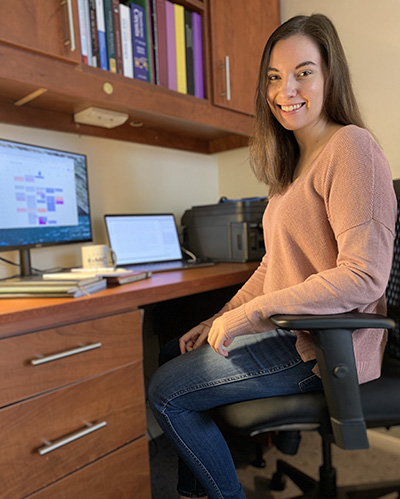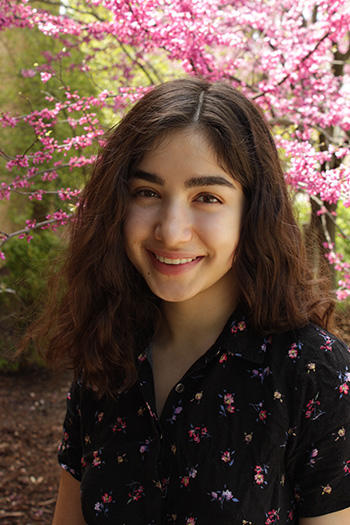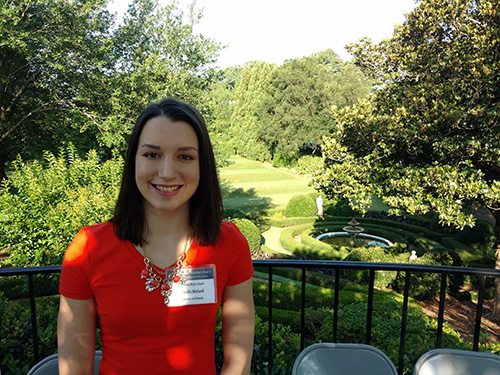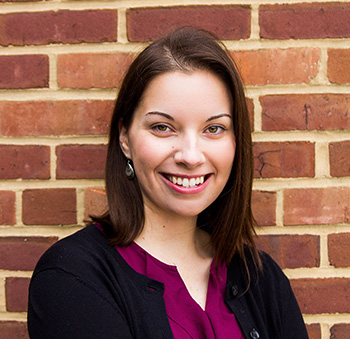DaRin Butz Scholars Program Uses Research to Direct Engineering Undergraduate Women onto a STEM Career Trajectory
 DaRin Butz Scholar Andrea Perry, a senior with a dual major in Engineering Physics and Materials Science and Engineering (MatSE). (Image courtesy of Andrea Perry.)
DaRin Butz Scholar Andrea Perry, a senior with a dual major in Engineering Physics and Materials Science and Engineering (MatSE). (Image courtesy of Andrea Perry.)
September 22, 2020
The goal of the Grainger College of Engineering’s DaRin Butz Foundation Research Scholars program is to encourage Illinois undergraduate women in engineering to pursue careers in science and engineering by immersing them in authentic research opportunities under some of Illinois’ premier researchers. The program, funded by the DaRin Butz Foundation since 2018, is under the umbrella of Grainger’s Illinois Scholars Undergraduate Research (ISUR) Program. The seven summer 2020 DaRin Butz scholars not only conducted research this past summer or during the 2020–21 academic year, but received professional development on how to present their research, then had opportunities to do so, such as in ISUR’s Fall 2020 Engineering Research Fair. Plus, the women had/are having a chance to network and through mentoring, discover what graduate school and/or careers in research might be like.
The original timeframe was for scholars to conduct research for 30–35 hours per week for 10 weeks in summer; however, due to COVID-19, some summer 2020 scholars postponed their research until the fall-spring, with the $5000-worth of funding also being shifted to the academic year. According to Natasha Mamaril, Director of the ISUR Program and Associate Director for Undergraduate Research in Engineering, four of the seven DaRin Butz summer 2020 scholars performed research this past summer; three are conducting theirs this fall and spring. Scholars conduct research in the following engineering disciplines: computer science, aerospace, electrical, computer, materials science, nuclear engineering, physics, or astronomy.
Based on the learning-by-apprenticeship model, the program designates that each scholar perform research mentored by a faculty member or another designated researcher who helps to guide their research, answer questions, and serve as role models. In addition to developing their research skills, students also get to improve and practice their science communication/ presentation skills by presenting their work in the Fall Engineering Research Fair the annual ISUR Poster Expo in April, 2021.
Plus, since the program is under the ISUR umbrella, scholars have access to ISUR events, research seminars, and/or workshops. For example, one fall 2020 talk was about how to apply to graduate school; several job opportunity events held via Zoom featured federal labs. Plus, students are taking ISUR’s undergraduate research course, ENG 199 UGR, this fall. The course introduces scholars to the research process plus helps hone their skills, both to perform research and to communicate it via both written and verbal communication, with class topics addressed via lectures, guest speakers, and interactive class discussions.
 DaRin Butz scholar Liana Koleva, a rising sophomore in Electrical & Computer Engineering (ECE). (Image courtesy of Liana Koleva.)
DaRin Butz scholar Liana Koleva, a rising sophomore in Electrical & Computer Engineering (ECE). (Image courtesy of Liana Koleva.)
Liana Koleva is a rising sophomore in Electrical & Computer Engineering (ECE). As part of her DaRin Butz scholarship, she’s working with Associate Professor Matthew Caesar beginning this fall and throughout the academic year. Her research involves creating an online database of computer networking educational sources to provide an organized space for university educators to ease the transition to distance learning.
Koleva is particularly interested in this area of research because she hopes to give back: “ I feel that given the wonderful educational opportunities I have received,” she acknowledges, “it is my duty to help move forward the status quo of our society. Specifically, ensuring equitable access to engineering education is important at a time when the educational landscape is being transformed so rapidly.”
Through the experience, Koleva hopes to develop skills in full-stack web development, iterative and staggered rollout, and gathering and analyzing usage statistics. Plus, she hopes to publish a technical paper and present at conference(s).
This isn’t Koleva’s first time conducting research. She’s worked with ECE’s MOCVD group fabricating power inductor devices using the Self Rolled-up Membrane (SRuM) platform. Via her work, she helped to improve inductor performance, plus she also contributed to developing fabrication techniques for the passive devices.
She’s also conducted research at Fermi National Accelerator Laboratory helping to optimize energy consumption of particle accelerators by testing different materials under varying levels of stress then computationally analyzing the data to find the most viable alloy for superconducting radiofrequency cavities.
Regarding her plans for the future, Koleva believes research is in her future because she intends to get a Ph.D. Several of her dream jobs include doing research and development at a national lab, becoming a professor, or doing research and development in industry.
 DaRin Butz scholar Michelle McCord. (Image courtesy of Michelle McCord.)
DaRin Butz scholar Michelle McCord. (Image courtesy of Michelle McCord.)
Another scholar is Michelle McCord, a senior studying Engineering Physics and an early-admitted graduate student in Nuclear Engineering. She works with Professor Brooks in the Multiphase Thermo-Fluid Dynamics Laboratory (MTDL). In fact, she started her research project in August 2019 and is continuing it into her Master's thesis. Her research is focused on studying the fundamental science of thermodynamics in the film-boiling region for nuclear power applications.
“I believe nuclear power in the most viable solution we have available right now to combat climate change,” McCord explains. “By studying the thermodynamics of the systems, we can make nuclear power plants more efficient and safer for widespread use.”
While she indicates that her work with the MTDL is not her first research opportunity, (she’s done research before with the Physics Education research group), she says she’s been working with MTDL for some time now, and that they have been her primary group for research.
Regarding the benefit of being a DaRin Butz scholar, McCord reports: “This project and working with the DaRin Butz Foundation Scholars has allowed me to further expand my research and lead my own project independently.” In the future, McCord hopes to work in the field of research and development for nuclear power applications, possibly with current reactor designs or small modular reactors.
 DaRin Butz scholar Andrea Perry. (Image courtesy of Andrea Perry.)
DaRin Butz scholar Andrea Perry. (Image courtesy of Andrea Perry.)
One summer 2020 DaRin Butz scholar was Andrea Perry, who’s pursuing dual B.S. degrees in Engineering Physics and Materials Science and Engineering (MatSE) and is a senior on target to graduate in May 2021.
Working in MatSE Professor Fahad Mahmood’s lab, Perry began her research in August 2019 and will continue through Summer 2021. Her research involves exploring light-matter interactions in strongly correlated systems, specifically by using THz light to realize interesting magnetic phases in low-dimensional materials. Perry is currently working to develop sources of strong THz fields for nonlinear optical studies of conventional and frustrated antiferromagnetic materials. Interesting fundamental science aside, Perry says this work may also inform technologies in quantum computing, specifically in fields such as spintronics.
Perry says she’s interested in her current area of research because, prior to her work in experimental condensed matter physics, she completed multiple research projects at the intersection of applied physics and materials science; specifically, the projects focused on photonic materials and device design. For example, her previous work included an NSF undergraduate research fellowship at UC San Diego in silicon-based nanomaterials; a two-year project completed in MatSE at Illinois focused on microphotonic device design, and a WAVE research fellowship done at the California Institute of Technology was in photonic materials.
Regarding the relationship of her previous work to her current work studying light-matter interactions in quantum materials, she says her DaRin Butz research “combines all of the fun elements of this more applied work (optics, lasers, cool instruments) with the exciting world of fundamental physics.”
Perry explains what about research itself intrigues her. “I'm interested in research, in general,” she admits, “because it's all about solving problems! Often, these problems are much less well-defined than those one might encounter in coursework and, especially in condensed matter physics, are often very interdisciplinary and require collaboration with materials scientists, engineers, and others; however, these challenging features of research are what I enjoy the most.”
Perry discusses the impact she believes the research experience has had on her so far, acknowledging that she’s no longer afraid to fail: “I think being a part of scientific research has challenged the way I approach solving problems, because the whole process of research is often very nonlinear and involves a lot of trial and error,” she claims. “If anything, I've become more comfortable with making mistakes or failing outright, because I've learned the most from these experiences, and they often become starting points for rethinking an approach or question.”
Perry definitely plans to pursue research as part of her future career. For example, after graduation, she intends to pursue a PhD in experimental condensed matter physics focused on light-matter interactions in strongly correlated systems. In the long-term, her dream job is to become a professor, conducting research at the intersection of physics and materials engineering while also balancing teaching and science outreach.
(See ISUR's website for bios on all seven DaRin Butz Scholars.)
Story and photographs by Elizabeth Innes, Communications Specialist, I-STEM Education Initiative.
More: Engineering, Undergrad, Undergraduate Research, 2020
For more I-STEM articles about Engineering undergraduate research, see:
- Undergraduate Women Conduct STEM Research Courtesy of Engineering’s Clare Boothe Luce Scholars Program
- Via ISUR, Engineering Undergrads Conduct Research, Present at Virtual Expo
- ISUR Poster Expo Showcases Engineering Scholars' Research
- Engineering’s Undergraduate Research Office Encourages Undergrads to Experience Research













.jpg)
















